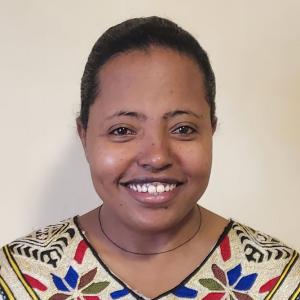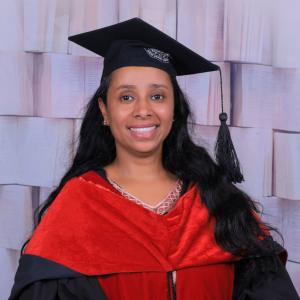Expanding capacity of the One Health approach through education, training and research is the cornerstone of the Global One Health initiative’s (GOHi) mission.
As part of a Fogarty Global Health Training Program grant from the National Institutes of Health, GOHi developed the One Health Eastern Africa Research Training (OHEART) program. The purpose of the program is to build capacity of eastern African academic institutes located in Ethiopia, Kenya and Tanzania through a PhD and post-doctoral fellowship program in foodborne, waterborne and vector-borne diseases. Candidates spend one and a half years at Ohio State and two and a half years at their home university.
Utilizing the OHEART program and other projects, GOHi supported three fellows during their PhD programs through mentorship, financial resources, research projects in Ohio and Ethiopia and more.

Woinshet Hailu, an OHEART fellow from Ethiopia, completed her PhD in tropical and infectious diseases from Aklilu Lemma Institute of Pathobiology, Addis Ababa University. She focused on assessing the burden of foodborne pathogens and antimicrobial resistance in vegetable farms amended by animal manure in Ethiopia and Ohio.
“Pursuing a PhD is a transformative step towards achieving my professional goals,” Hailu said. “It provides me deep and specialized knowledge in my study area and gives me the opportunity to connect with leading scholars, researchers and professionals in my field, which will lead to collaborations, job opportunities and mentorship.”
As part of her program, Hailu was a visiting scholar at the Ohio State Agricultural Technical Institute (ATI) in Wooster, where she continued her research with experts from Ohio State.
“Ohio State offers extensive libraries, specialized research facilities and a wide array of academic resources that significantly enhanced my research capabilities,” Hailu said.

Seifegebriel Teshome, a faculty member in the College of Health Sciences at Addis Ababa University, received his PhD in medical microbiology. The focus of his doctoral research was on molecular epidemiology and genetic diversity of Epstein-Barr virus (EBV) among lymphoma patients in Ethiopia.
“This PhD is very instrumental in advancing my career and achieving my professional goals. Through rigorous research, critical thinking and specialized training in medical microbiology, my PhD has equipped me with the expertise and skills needed to excel in my chosen career path,” Teshome said. “This advanced degree has not only opened up new opportunities but has also enabled me to make significant contributions to my field.”
Seifegebriel completed research at Ohio State on two occasions as a visiting scholar on the Epstein-Barr virus (EBV) project led by Robert Baiocchi, The Ohio State University Wexner Medical Center.
“One of my most significant accomplishments from my PhD studies and time as a visiting scholar at Ohio State was defending my thesis with outstanding excellent achievement,” Seifegebriel said. “During my time as a visiting scholar at Ohio State, I had the privilege of receiving different training that equipped me to perform different laboratory activities. Engaging in various laboratory activities not only enhanced my skills but also played a pivotal role in completing my PhD project successfully.”

Kidist Zealiyas, an OHEART fellow from Ethiopia, completed her PhD in tropical and infectious diseases from the Aklilu Lemma Institute of Pathobiology, Addis Ababa University. Her research focused on molecular epidemiology and seroprevalence of Epstein-Barr virus among HIV-positive and negative individuals in Addis Ababa, Ethiopia.
“Being able to lead this pioneering research was a major achievement because it not only filled a significant gap in the scientific literature but also provided valuable insights that could influence public health strategies in Ethiopia and similar settings,” Zealiyas said.
As part of her PhD, Zealiyas came to Ohio State twice as a visiting scholar on the EBV project led by Robert Baiocchi, The Ohio State University Wexner Medical Center.
“The biggest accomplishment from my PhD studies and my time as a visiting scholar at Ohio State was conducting a groundbreaking study on the molecular epidemiology of Epstein-Barr Virus (EBV) among HIV-positive individuals in Ethiopia. This was the first study of its kind, and it has contributed significantly to understanding the interaction between EBV and HIV in a context where such research is critical but limited,” Zealiyas said.